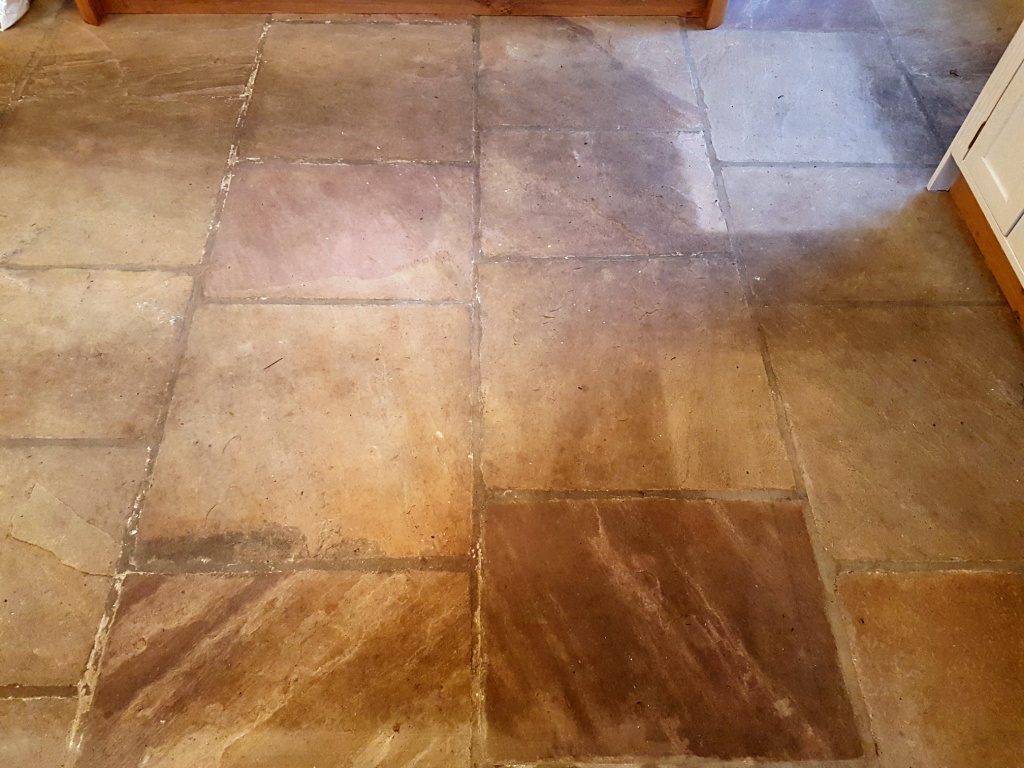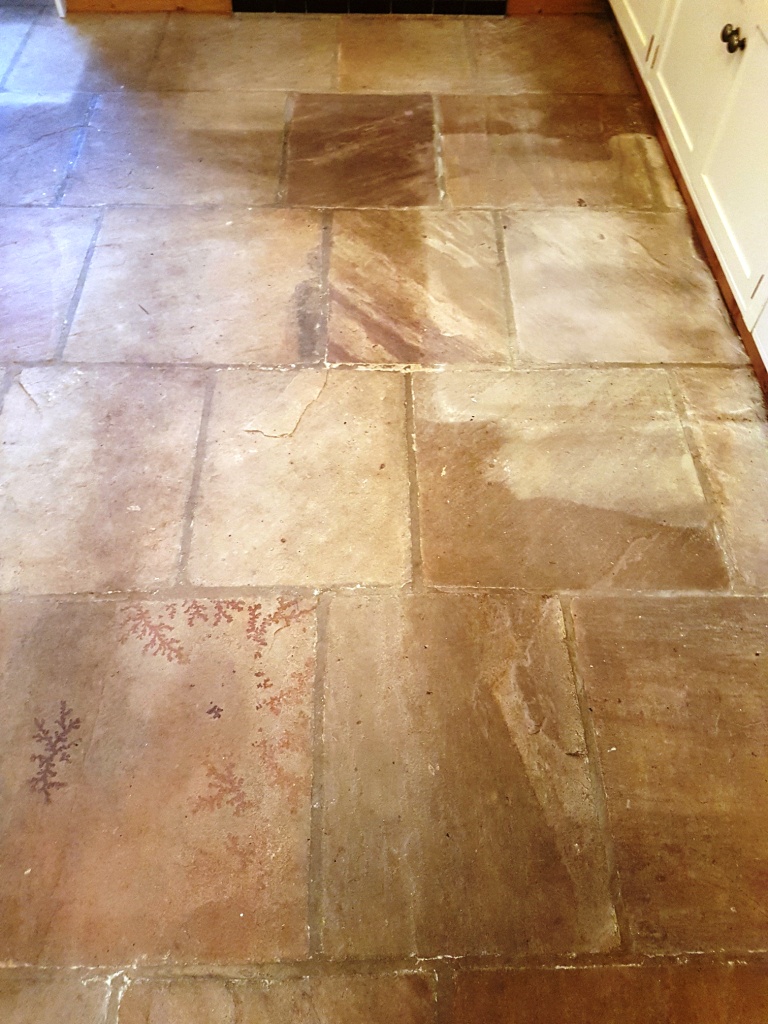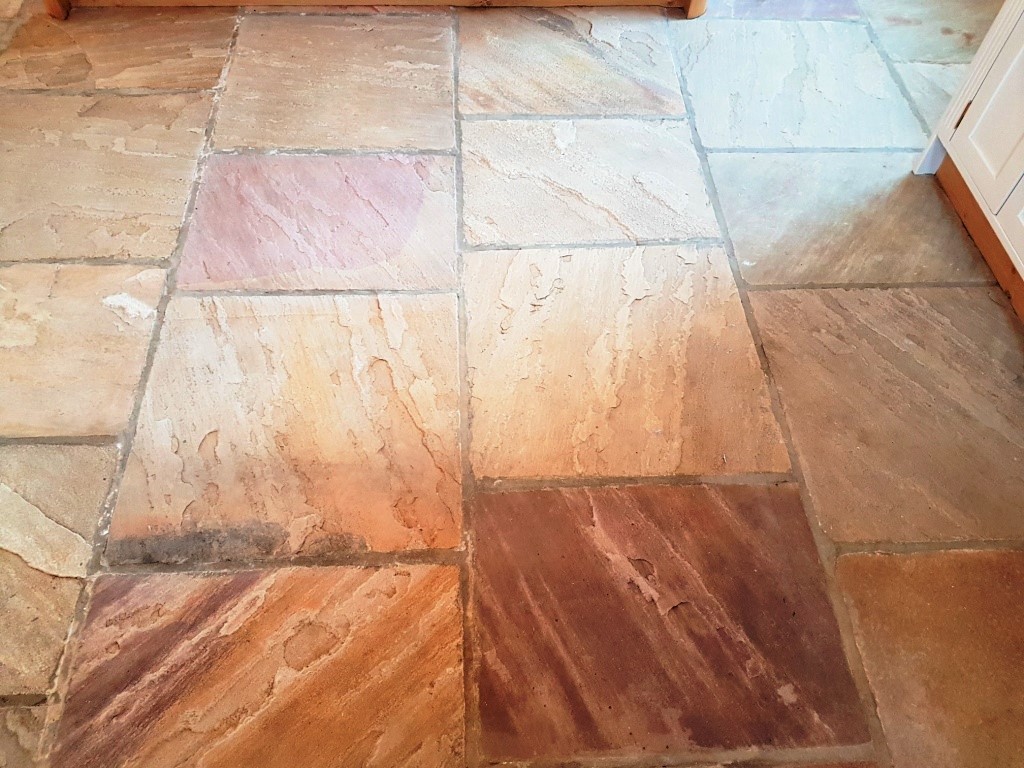The stone floor in the pictures is an Indian Fossil Sandstone which had been installed in the Kitchen of a house in the North Yorkshire market town of Thirsk. The Sandstone tiles had not been professionally cleaned and sealed for ten years so and was now overdue a deep clean. The customer had tried cleaning it but gave up and give me a call instead as no matter what she did nothing seemed to make a difference.

They had been using numerous household cleaners to maintain the floor which doesn’t help as many supermarket cleaning products are too strong for use on a sealed floor and will prematurely reduce the life of the sealer. Without the protection of a sealer dirt becomes ingrained in the stone making it very difficult to clean effectively. Another problem was that the Sandstone tiles were very uneven and rough in texture, so the dirt was getting caught in the bumps which didn’t help.
 |
 |
I went over to the property in Thirsk to survey the floor and conduct a test clean, so they could see how the stone would look on completion. The Sandstone responded well to treatment and we agreed a date for me to return and complete the floor.
Maintenance issues aside Sandstone pavers look great in a Kitchen where they give a rustic farmhouse appearance that brings the outside in. Imported from India, Indian Fossil Sandstone is full of character and with prices from around £19m2, very affordable. Due to the thickness of the stone we wouldn’t recommend using pavers with under floor heating.
Cleaning an Indian Fossil Sandstone Floor
To get the stone clean and remove what was left of the sealer I applied a strong dilution of Tile Doctor Pro-Clean and allowed it to soak into the tile for about ten minutes before scrubbing it in with a black pad fitted to a rotary floor buffer.
This removed a lot of the dirt and stains however floor pads struggle on uneven surfaces, so I found that to get the stone and grout really clean I had to rescrub most of them by hand. The soiled cleaning solution was then rinsed off with water and extracted with a wet vacuum. The floor was then inspected, and any stubborn areas retreated using the same process and more Tile Doctor Pro-Clean. The floor was then left to dry off overnight in preparation for it being sealed.
Sealing an Indian Fossil Sandstone Tiled Kitchen Floor
I returned the next day to finish the renovation. First, testing the floor with the moisture meter to ensure it was dry enough to take the sealant. I started by applying two coats of Tile Doctor Ultra Seal which will protect against ongoing dirt and stains. You can always tell when stone floor has had enough sealer applied by adding a droplet of water to the tile, if it forms a bubble on the surface then you know its sealed. I demonstrated this to the customer, so they would know in future and could give us a call when they needed to redo the floor.
 |
 |
As before the Sandstone responded well to the treatment leaving it much cleaner and lighter in appearance. The floor had a lovely variety of colours and you could now clearly see the fossils trapped in the stone. Before leaving I recommended that they use a pH neutral cleaning product going forward such as Tile Doctor Neutral Tile Cleaner which is specifically designed for cleaning sealed floors and will help keep the floor maintain its appearance.
My customer was amazed at the transformation and left the following feedback for me.
“Floor has never been cleaner! Elizabeth R, Thirsk”



When cleaning sealed tiles with a mop we recommend using two buckets, one containing a neutral pH cleaning fluid such as Tile Doctor Neutral Tile Cleaner or Stone Soap and the second where you rinse your mop afterwards, otherwise you will contaminate your cleaning fluid with dirt.